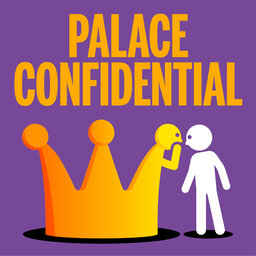Me-me-Meghan’s podcast fails to impress and have the Cambridges made a PR blunder over their new home?
The Duchess of Sussex needs to learn that a key part of interviewing is to listen to your subject – that’s the view of the Daily Mail’s Diary Editor Richard Eden.
Meghan’s much-anticipated podcast Archetypes launched this week with an interview with tennis star Serena Williams, but it was Meghan’s revelations about life in the Royal Family that seemed to attract the most media interest.
‘It was very much “that’s enough about me, what do you think of me?”’ Eden says. ‘Instead of Serena making the headlines, all the headlines have been about Meghan’s stories and the things she’s disclosed during this podcast and it was a missed opportunity, certainly for Serena. Given that, I’m not sure famous people will be queuing up to go on it, because they’ll know it’s actually all about the supposed interviewer.’
The Daily Mail’s Editor at Large Richard Kay meanwhile, believes that the way that Meghan and Harry (who makes a brief appearance in Archetypes) have gone about their new broadcasting career shows the differences between them at their in-laws.
‘They are competing with the usually footsure Cambridges, who seem to go deftly about their royal routine without causing offence or making it all about them,’ he tells the programme. ‘Harry and Meghan seem to think the only way to avoid being crowded out is to make it just about them.’
However, Kay argues that one area that the Cambridges didn’t handle so deftly in Kay’s view, was announcing that they were taking on another property as the country battles a cost-of-living crisis.
‘Timing is everything and the Royals are very sensitive to how they are perceived by the public and it just looks slightly extravagant, slightly over-the-top,’ he adds.
Ahead of the 25th anniversary of the death of Diana, Princess of Wales, Daily Mail columnist and author of Queen of Our Times reflects on the relationship between Her Majesty and her daughter-in-law.
‘I think there is this idea that Diana’s death somehow was an electric cattle prod that suddenly turned this Victorian institution into a modern institution… that’s a complete misreading,’ he says, adding ‘certainly there was a greater openness to doing things differently, that was very much a Diana legacy if you like.’
Palace Confidential
Palace Confidential is weekly royal podcast on the British royal family. Host Jo Elvin, editor of Yo…Follow podcast
Recent clips

Harry and Meghan’s UK tour is about ‘having their cake and eating it’ ... and are the Sussexes planning on renewing their vows?
20:00

What DID the Queen say to Boris? And who is ‘trying to create a bit of mischief’ around moneybags Charles? Watch our royal talkshow for the latest
22:00

Palace ‘desperate not to upset’ the Sussexes as Meghan bullying row ‘swept under the carpet’ – we look at the latest news in our unmissable royal talk show Palace Confidential
19:54
 Palace Confidential
Palace Confidential